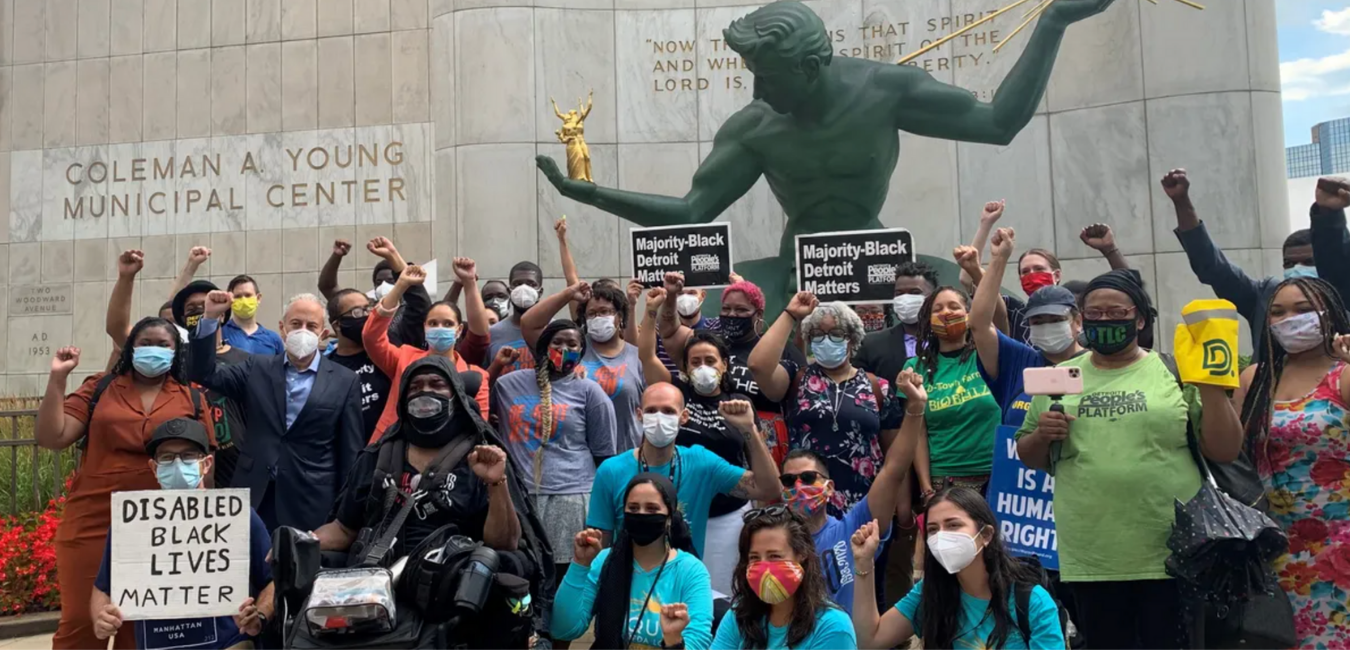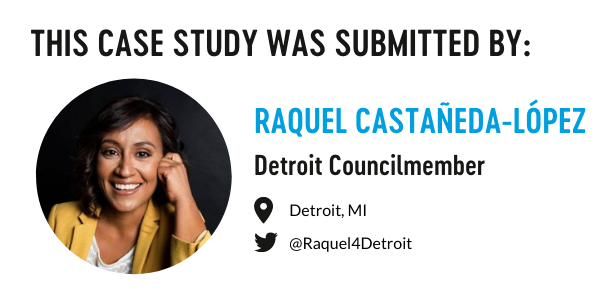Resident Bill of Rights
Detroit, MI
Population: 500,000-1,000,000 | Government type: City | Topic: Codifying Resident Rights into a City Charter
OVERVIEW
In the wake of the police murder of George Floyd and the civil uprising that followed, community groups across Detroit made clear that their long-voiced demands needed to be met with real systemic change. Meanwhile, the city’s charter was open for revisions and input from the public. Advocates, organizers, and elected officials came together to translate community demands into charter amendments and capitalize on this opportunity to embed equity and justice directly into the city’s constitution. The comprehensive package of amendments became known as the Detroiters’ Bill of Rights.
No longer would the charter be seen simply as an intangible or archaic document; instead it would serve as a tool to change policy and to implement a broad coalition’s racial, social, and economic justice policies into the foundation of the city’s governance. The Detroiters’ Bill of Rights is both visionary and specific: its proposals range from guaranteeing rights like the right to safety and the right to environmental health, to creating new representative government structures like the Office of Immigrant Affairs, to establishing a water affordability program and a public transit low-income fare.
Right to Water and Sanitation: Every resident has a right to clean and affordable water and sanitation for personal and domestic use.
Right to Environmental Health: Every resident, regardless of their ZIP code, is entitled to live in an environment with clean air, soil and water.
Right to Safety: Every resident is entitled to live in safe communities and has the right to live free of threat or harm from one another and city agencies.
Right to Live Free from Discrimination: Every resident, regardless of their immigration status, is guaranteed the same fundamental rights and protection of the law from discriminatory practices. Every person with disabilities in Detroit is entitled to the same rights and freedoms as non-disabled people in the city, including access to services, programs, and infrastructure.
Right to Recreation: Every resident is entitled to access to parks, recreational opportunities, and urban green spaces to protect and enhance their health and well-being.
Right to Mobility: Every resident, regardless of their ZIP code, has the right to safe, accessible, and affordable public transit options whether walking, biking, driving, rideshare, or using public transit, that enables free and fair movement throughout the city.
Right to Housing: Every Detroit resident is entitled to affordable, habitable, safe, and accessible housing.
Right to Fulfillment of Basic Needs: Everyone has the right to a standard of living adequate for the health and well-being of themselves and of their family, including food, utilities, and water and sanitation, clothing, affordable and accessible housing, and medical care and necessary social services, and the right to care in the event of unemployment, sickness, disability, widowhood, old age or other lack of livelihood in circumstances beyond their control. (Adopted from United Nations Declaration of Human Rights, Article 25)
Critically, the Bill of Rights proposal included budgeting principles that outlined what would be required financially to realize the aims articulated in the proposals. The proposal called on the city to use either general fund revenue or other revenue sources to realize the commitments in the Bill of Rights. The proposal authors went through the budget item by item to identify the current level of funding and the subsequent need if the Bill of Rights were to be enacted. For fare-free transit, for example, the Bill of Rights would require an additional $15 million allocation on top of the current $60 million annual allotment for transit. And while the equitable budgeting principles were the only piece of the proposal to not pass the Charter Commission, they created space for another proposal to pass that expresses a commitment for the city to shift resources out of policing and into community needs like health and housing. Bill of Rights advocates are still fighting for their equitable budgeting principles, now just outside of the charter revision process.
In 2018, Detroit voters elected nine charter commissioners to serve on a Charter Review Commission charged with considering changes to the city’s constitution. Several ran for the commission on a platform of revising the charter in a participatory and equity-minded way, calling for the city’s governance to empower everyday residents and the city council, while reducing the executive’s power. One commissioner, Denzel McCampbell, described the commission’s process as being “about uplifting the priorities of residents so that everyone can have their ability to have a good quality of life.” The last changes to the city charter were made in 2012 and the proposals constituting the Detroiters’ Bill of Rights, having now been passed by the commission, will go to the ballot in August 2021. Yet with such a visionary platform, aspects of the Bill of Rights can be pursued in the meantime via budget measures, resolutions, and council ordinances.
Collaborative Governance
More than 150 organizations have signed onto the Bill of Rights, and the organizing effort has engaged and brought together many longstanding community-based coalitions on topics as wide-ranging as disability justice, environmental racism, and affordable housing. These coalitions worked in great depth with Council President Pro Tempore Mary Sheffield and Councilmember Raquel Castañeda-López to convert community demands into charter action items and policy proposals appropriate for the charter, a process that necessitated an authentic co-creation of the Bill of Rights. This required extensive relationship-building in some cases, whereas in other areas, like with water rights, there were already long-established working relationships between the council offices and the advocates.
This effort, and the organizing process it requires, is also an effort to repair and heal longstanding mistrust that various communities feel toward their local government, having borne the brunt of harmful policy or repeatedly promised a say in decision-making only to be excluded from power. The Detroiters’ Bill of Rights is an exercise in solidarity and intersectionality. With so many groups and coalitions involved in the effort, the organizing process has connected people across issues and geography. And to pass their proposals through the Charter Commission (and later this year, at the ballot), various organizations had to fight for one another’s issues, reinforcing the intersectional nature of the effort. Transit proponents fought for proposals about policing, for instance. This ensured that communities and advocates could not be pitted against each other. To win their agenda at the ballot this August, they’ll have to continue to work collaboratively.
Emphasis on equity
The central values and principles behind this effort were made clear from the beginning: racial equity, social justice, and collective liberation centering the Black community. Detroit is a majority Black city and holds a rich legacy of Black-led social justice organizing, as well as a legacy of exclusion and disinvestment of Black communities. Participants in the creation of the Bill of Rights developed and abided by community agreements throughout the process, ensuring that the proposals would honor the longtime efforts, experience, and tradition of those who have fought for these rights for generations. While city governance is too often an area made thoroughly inaccessible by esoteric procedure and specialized knowledge, the Bill of Rights effort has emphasized radical inclusion.
In effect, this process dares to transform the very notion of a city's founding document into one shaped and informed by resident voices and community needs. This has not been easy. It is one thing to have a vision for what a community needs or demands to be met. It is quite another to translate those into actionable items for a city charter. Yet through it all, the Bill of Rights proponents have met this challenge. Now, their proposals are on their way to a citywide vote this August. If they are successful, they will set a new standard for what can be accomplished and committed to in a city’s constitution, so that future generations don’t have to go through the same struggles that their predecessors have for decades.
Analysis
The city charter has not been seen as a transformative proposal of racial equity and social justice like this, both in Detroit and across the country. So there is some reflexive resistance to what is being imagined here.
The charter revision process includes several steps and therefore requires a long and sustained effort on the part of the Bill of Rights proponents. If the Charter Review Commission adopts the proposals, the new draft charter is then sent to the Attorney General for final review to ensure no conflict with state law.
Finally, the new charter will go before voters to adopt in August 2021.
Having an elected charter review commission was pivotal in making this possible.
Part of the challenge in realizing this Bill of Rights will be striking a balance between what can be accomplished through charter revision, budgeting, resolutions, and ordinances.
Recommendations for building momentum against opposition
It is critical to build a broad and issue-diverse coalition that both develops the proposals and advocates for them.
Power analysis of how character changes get vetted and approved.
What is feasible in the charter process and what is better realized via other means?
Last updated: January 19, 2021
If you’re interested in learning more, please contact info@localprogress.org

































